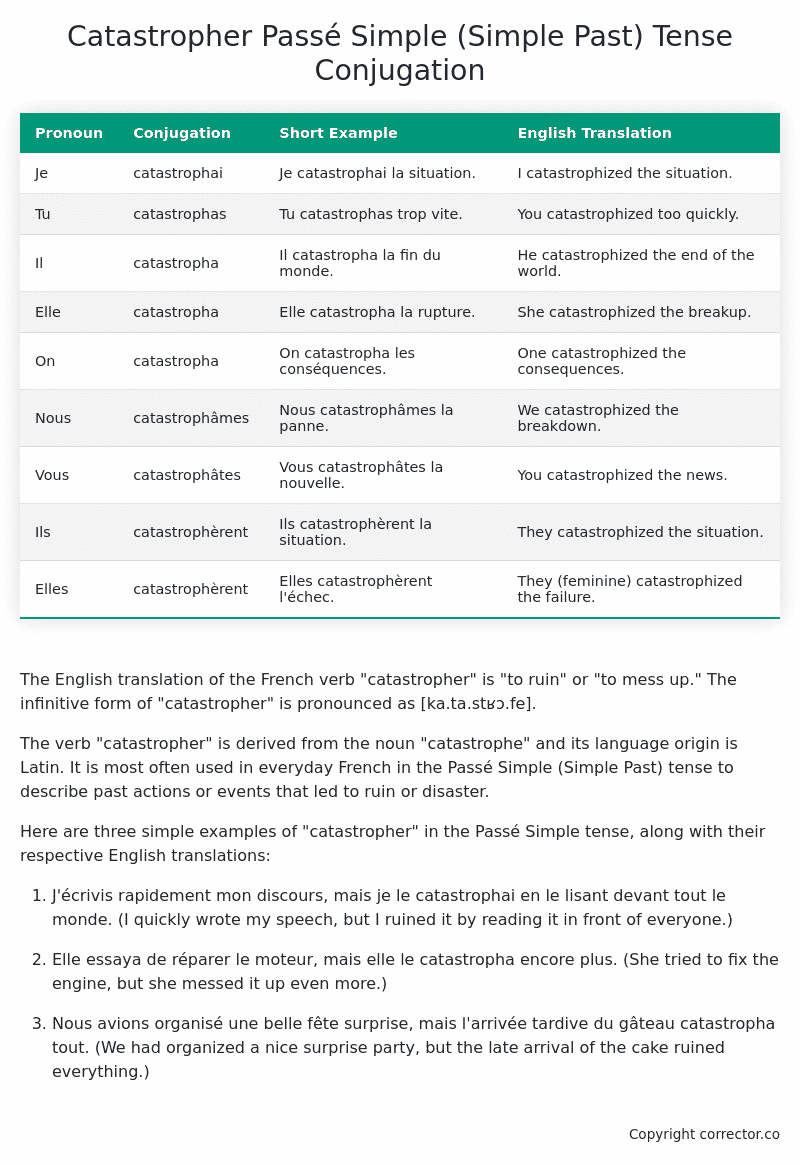Passé Simple (Simple Past) Tense Conjugation of the French Verb catastropher
Introduction to the verb catastropher
The English translation of the French verb “catastropher” is “to ruin” or “to mess up.” The infinitive form of “catastropher” is pronounced as [ka.ta.stʁɔ.fe].
The verb “catastropher” is derived from the noun “catastrophe” and its language origin is Latin. It is most often used in everyday French in the Passé Simple (Simple Past) tense to describe past actions or events that led to ruin or disaster.
Here are three simple examples of “catastropher” in the Passé Simple tense, along with their respective English translations:
-
J’écrivis rapidement mon discours, mais je le catastrophai en le lisant devant tout le monde.
(I quickly wrote my speech, but I ruined it by reading it in front of everyone.) -
Elle essaya de réparer le moteur, mais elle le catastropha encore plus.
(She tried to fix the engine, but she messed it up even more.) -
Nous avions organisé une belle fête surprise, mais l’arrivée tardive du gâteau catastropha tout.
(We had organized a nice surprise party, but the late arrival of the cake ruined everything.)
Table of the Passé Simple (Simple Past) Tense Conjugation of catastropher
| Pronoun | Conjugation | Short Example | English Translation |
|---|---|---|---|
| Je | catastrophai | Je catastrophai la situation. | I catastrophized the situation. |
| Tu | catastrophas | Tu catastrophas trop vite. | You catastrophized too quickly. |
| Il | catastropha | Il catastropha la fin du monde. | He catastrophized the end of the world. |
| Elle | catastropha | Elle catastropha la rupture. | She catastrophized the breakup. |
| On | catastropha | On catastropha les conséquences. | One catastrophized the consequences. |
| Nous | catastrophâmes | Nous catastrophâmes la panne. | We catastrophized the breakdown. |
| Vous | catastrophâtes | Vous catastrophâtes la nouvelle. | You catastrophized the news. |
| Ils | catastrophèrent | Ils catastrophèrent la situation. | They catastrophized the situation. |
| Elles | catastrophèrent | Elles catastrophèrent l’échec. | They (feminine) catastrophized the failure. |
Other Conjugations for Catastropher.
Le Present (Present Tense) Conjugation of the French Verb catastropher
Imparfait (Imperfect) Tense Conjugation of the French Verb catastropher
Passé Simple (Simple Past) Tense Conjugation of the French Verb catastropher (You’re reading it right now!)
Passé Composé (Present Perfect) Tense Conjugation of the French Verb catastropher
Futur Simple (Simple Future) Tense Conjugation of the French Verb catastropher
Futur Proche (Near Future) Tense Conjugation of the French Verb catastropher
Plus-que-parfait (Pluperfect) Tense Conjugation of the French Verb catastropher
Passé Antérieur (Past Anterior) Tense Conjugation of the French Verb catastropher
Futur Antérieur (Future Anterior) Tense Conjugation of the French Verb catastropher
Subjonctif Présent (Subjunctive Present) Tense Conjugation of the French Verb catastropher
Subjonctif Passé (Subjunctive Past) Tense Conjugation of the French Verb catastropher
Subjonctif Imparfait (Subjunctive Imperfect) Tense Conjugation of the French Verb catastropher
Conditionnel Présent (Conditional Present) Tense Conjugation of the French Verb catastropher
Conditionnel Passé (Conditional Past) Tense Conjugation of the French Verb catastropher
Conditionnel Passé II (Conditional Past II) Tense Conjugation of the French Verb catastropher
L’impératif Présent (Imperative Present) Tense Conjugation of the French Verb catastropher
L’impératif Passé (Imperative Past) Tense Conjugation of the French Verb catastropher
L’infinitif Présent (Infinitive Present) Tense Conjugation of the French Verb catastropher
L’infinitif Passé (Infinitive Past) Tense Conjugation of the French Verb catastropher
Le Participe Présent (Present Participle) Tense Conjugation of the French Verb catastropher
Le Participe Passé (Past Participle) Tense Conjugation of the French Verb catastropher
Struggling with French verbs or the language in general? Why not use our free French Grammar Checker – no registration required!
Get a FREE Download Study Sheet of this Conjugation 🔥
Simply right click the image below, click “save image” and get your free reference for the catastropher Passé Simple tense conjugation!

Catastropher – About the French Passé Simple (Simple Past) Tense
Formation
Usage
Narration
Historical Context
Interactions with other tenses
Passé Composé
Imparfait
Conditional and Subjunctive
Summary
I hope you enjoyed this article on the verb catastropher. Still in a learning mood? Check out another TOTALLY random French verb conjugation!


